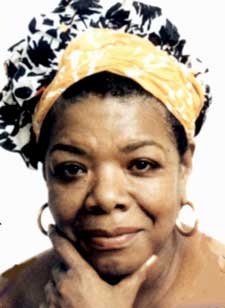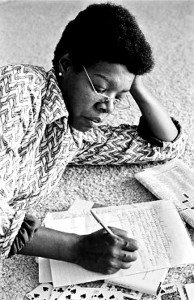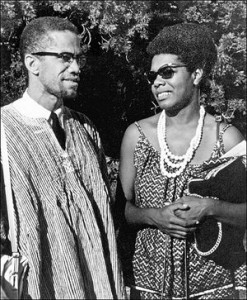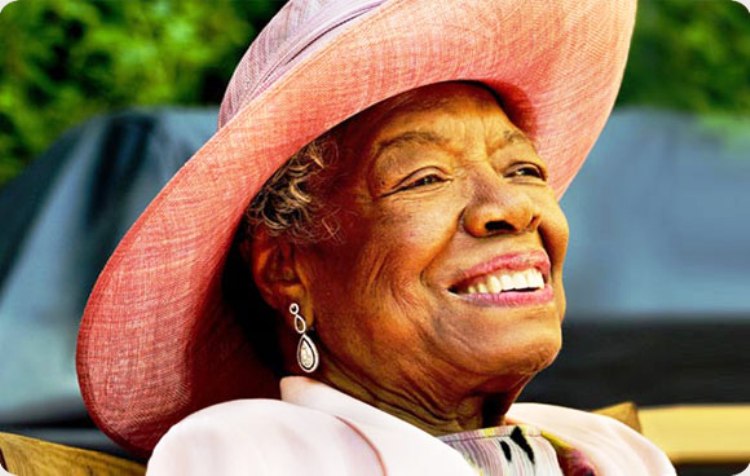
“When I try to describe myself to God I say, ‘Lord, remember me? Black? Female? Six-foot tall? The writer?’ And I almost always get God’s attention,” laughed Dr. Maya Angelou in a 2008 interview with NPR’s Lynn Neary.
 When we try to describe Dr. Maya Angelou, we have a hard time being so succinct. She embraced many identities: poet, playwright, author, actor, activist, producer, filmmaker, singer, speaker, leader, dancer, warrior and more, all with unshakeable faith and grace. She was an inspiration to millions around the world, and her life will forever be a brilliant example of hope and compassion.
When we try to describe Dr. Maya Angelou, we have a hard time being so succinct. She embraced many identities: poet, playwright, author, actor, activist, producer, filmmaker, singer, speaker, leader, dancer, warrior and more, all with unshakeable faith and grace. She was an inspiration to millions around the world, and her life will forever be a brilliant example of hope and compassion.
As a young women, she demurred when friends told her she should write an autobiography. “It’s just as well”, said her dear friend James Baldwin, “because to write an autobiography as literature is just about impossible.” The fiery Angelou instantly accepted the thinly-veiled dare and began work on I Know Why the Caged Bird Sings, a book remarkable for its unflinching portrait of a young black woman coming of age in the Jim Crow South.
 For the next two years, she dedicated herself to her writing ritual – waking early, checking herself into a hotel with a bottle of sherry and no distractions, and playing solitaire until she was “enchanted” and the story poured out of her heart.
For the next two years, she dedicated herself to her writing ritual – waking early, checking herself into a hotel with a bottle of sherry and no distractions, and playing solitaire until she was “enchanted” and the story poured out of her heart.
We couldn’t ask for a better model of emergence than I Know Why the Caged Bird Sings. Throughout the book, Maya transitions from a reactive girl filled with rage and humiliation by the injustices of prejudice and racism to a self-assured woman with hard-won independence, grace and dignity. By sharing her own struggle, Angelou gave women worldwide the courage to lift their own voices and express their individual selves.
Oprah Winfrey remembers being blown away by the book when she was a young girl. “Reading about her life gave value to my own,” she says. “The fact that she had not merely survived but triumphed allowed me to see the possibility of my own victory over adversity.”
“The fact that she had not merely survived but triumphed allowed me to see the possibility of my own victory over adversity.” ~Oprah Winfrey
The process of writing the book was an emergence in itself for Angelou. She had been living an isolated existence for several years after suffering a series of tragic losses chronicled in A Song Flung Up to Heaven.
 After living abroad (serving as editor of the English language weekly The Arab Observer in Egypt, teaching at the University of Ghana’s School of Music and Drama, working as feature editor for The African Review and writing for The Ghanaian Times, mastering French, Spanish, Italian, Arabic and the West African language Fanti) Angelou returned to the United States to help Malcolm X build his new Organization of African American Unity. Devastatingly, Malcolm X was assassinated before she could begin.
After living abroad (serving as editor of the English language weekly The Arab Observer in Egypt, teaching at the University of Ghana’s School of Music and Drama, working as feature editor for The African Review and writing for The Ghanaian Times, mastering French, Spanish, Italian, Arabic and the West African language Fanti) Angelou returned to the United States to help Malcolm X build his new Organization of African American Unity. Devastatingly, Malcolm X was assassinated before she could begin.
As she tried to reassemble her life, performing, singing, and conducting door-to-door surveys to support herself and her son, racial tensions reached a boiling point and race riots erupted in her city. During a visit to New York, Angelou met Martin Luther King, Jr., who asked her to become his coordinator in the North. When tragedy strikes again with King’s assassination on April 4, 1968, Dr. Angelou is so devastated that she withdraws completely.
It is during this time of isolation that her dear friend James Baldwin coaxes her out of her solitude and convinces her to passionately work for justice and equality in a new an unexpected way, by sharing her own story. As Angelou famously said, “You may not control all the events that happen to you, but you can decide not to be reduced by them.”
“You may not control all the events that happen to you, but you can decide not to be reduced by them.”
Far from being reduced by them, Maya Angelou let them flow through her to create more than 30 best-selling works of fiction, non-fiction and verse. Additionally, she was a trailblazer in the film industry, writing the first script by an African American woman to be nominated for a Pulitzer Prize.
She has served on two presidential committees, was awarded the Presidential Medal of Arts in 2000, the Lincoln Medal in 2008, and has received 3 Grammy Awards. President Clinton requested that she compose a poem to read at his inauguration in 1993. Dr. Angelou’s reading of her poem “On the Pulse of the Morning” was broadcast live around the world.
The pages and pages of Dr. Maya Angelou’s honors and awards are a testament to the power her truth. She also held over 30 honorary degrees and was Reynolds Professor of American Studies at Wake Forest University.
Her lifelong dedication to uplift humanity through her life and art will forever influence and inspire us in our work. We mourn her death, but more importantly celebrate her life, the life of a truly Phenomenal Woman. We leave you with a recording via BrainPickings of her unforgettable voice reading the poem, Phenomenal Woman:
“I am a woman. Phenomenally.”


